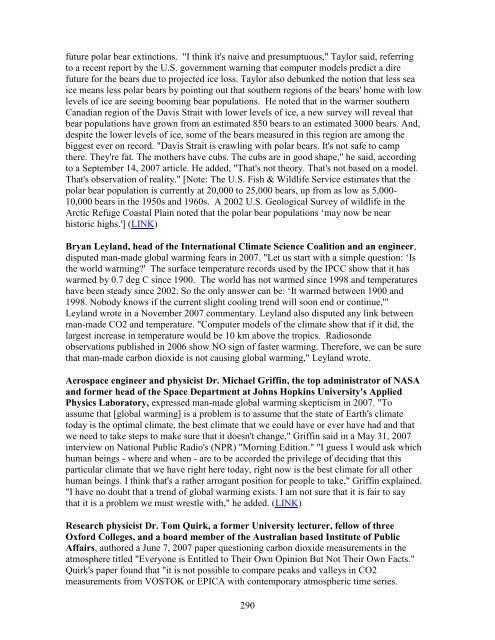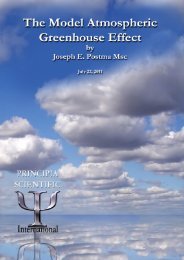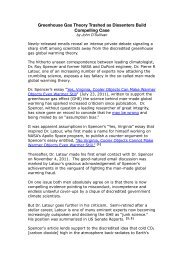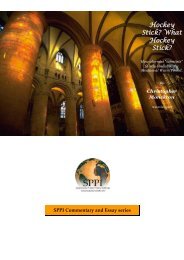Than 1000 International Scientists Dissent Over Man-Made Global ...
Than 1000 International Scientists Dissent Over Man-Made Global ...
Than 1000 International Scientists Dissent Over Man-Made Global ...
Create successful ePaper yourself
Turn your PDF publications into a flip-book with our unique Google optimized e-Paper software.
future polar bear extinctions. "I think it's naive and presumptuous," Taylor said, referring<br />
to a recent report by the U.S. government warning that computer models predict a dire<br />
future for the bears due to projected ice loss. Taylor also debunked the notion that less sea<br />
ice means less polar bears by pointing out that southern regions of the bears' home with low<br />
levels of ice are seeing booming bear populations. He noted that in the warmer southern<br />
Canadian region of the Davis Strait with lower levels of ice, a new survey will reveal that<br />
bear populations have grown from an estimated 850 bears to an estimated 3000 bears. And,<br />
despite the lower levels of ice, some of the bears measured in this region are among the<br />
biggest ever on record. "Davis Strait is crawling with polar bears. It's not safe to camp<br />
there. They're fat. The mothers have cubs. The cubs are in good shape," he said, according<br />
to a September 14, 2007 article. He added, "That's not theory. That's not based on a model.<br />
That's observation of reality." [Note: The U.S. Fish & Wildlife Service estimates that the<br />
polar bear population is currently at 20,000 to 25,000 bears, up from as low as 5,000-<br />
10,000 bears in the 1950s and 1960s. A 2002 U.S. Geological Survey of wildlife in the<br />
Arctic Refuge Coastal Plain noted that the polar bear populations ‗may now be near<br />
historic highs.'] (LINK)<br />
Bryan Leyland, head of the <strong>International</strong> Climate Science Coalition and an engineer,<br />
disputed man-made global warming fears in 2007. "Let us start with a simple question: ‗Is<br />
the world warming?' The surface temperature records used by the IPCC show that it has<br />
warmed by 0.7 deg C since 1900. The world has not warmed since 1998 and temperatures<br />
have been steady since 2002. So the only answer can be: ‗It warmed between 1900 and<br />
1998. Nobody knows if the current slight cooling trend will soon end or continue,'"<br />
Leyland wrote in a November 2007 commentary. Leyland also disputed any link between<br />
man-made CO2 and temperature. "Computer models of the climate show that if it did, the<br />
largest increase in temperature would be 10 km above the tropics. Radiosonde<br />
observations published in 2006 show NO sign of faster warming. Therefore, we can be sure<br />
that man-made carbon dioxide is not causing global warming," Leyland wrote.<br />
Aerospace engineer and physicist Dr. Michael Griffin, the top administrator of NASA<br />
and former head of the Space Department at Johns Hopkins University's Applied<br />
Physics Laboratory, expressed man-made global warming skepticism in 2007. "To<br />
assume that [global warming] is a problem is to assume that the state of Earth's climate<br />
today is the optimal climate, the best climate that we could have or ever have had and that<br />
we need to take steps to make sure that it doesn't change," Griffin said in a May 31, 2007<br />
interview on National Public Radio's (NPR) "Morning Edition." "I guess I would ask which<br />
human beings - where and when - are to be accorded the privilege of deciding that this<br />
particular climate that we have right here today, right now is the best climate for all other<br />
human beings. I think that's a rather arrogant position for people to take," Griffin explained.<br />
"I have no doubt that a trend of global warming exists. I am not sure that it is fair to say<br />
that it is a problem we must wrestle with," he added. (LINK)<br />
Research physicist Dr. Tom Quirk, a former University lecturer, fellow of three<br />
Oxford Colleges, and a board member of the Australian based Institute of Public<br />
Affairs, authored a June 7, 2007 paper questioning carbon dioxide measurements in the<br />
atmosphere titled "Everyone is Entitled to Their Own Opinion But Not Their Own Facts."<br />
Quirk's paper found that "it is not possible to compare peaks and valleys in CO2<br />
measurements from VOSTOK or EPICA with contemporary atmospheric time series.<br />
290





